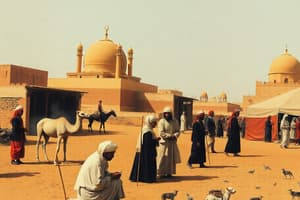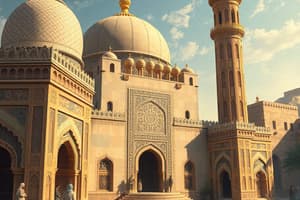Podcast
Questions and Answers
Prior to the rise of Islam, what was a significant factor that influenced the social structure of Arab communities?
Prior to the rise of Islam, what was a significant factor that influenced the social structure of Arab communities?
- The harsh environment, leading to clan-based organization. (correct)
- A centralized political system headed by a powerful king.
- Extensive agricultural practices that fostered large settlements.
- Widespread adoption of a unified legal code.
What role did Arabs play in trade before the emergence of Islam?
What role did Arabs play in trade before the emergence of Islam?
- They were isolated from major trade routes due to their nomadic lifestyle.
- They primarily focused on agriculture and did not participate in trade networks.
- They were major carriers of trade between the Persian Gulf and the Mediterranean Sea. (correct)
- They only traded amongst themselves and were not a part of international commerce.
What is the central concept of Islam?
What is the central concept of Islam?
- The belief in multiple gods, each with distinct powers.
- The concept of *jihad* as the primary duty of all followers.
- Submission to the will of one God, Allah. (correct)
- The establishment of a vast empire through military conquest.
How did the clan organization contribute to maintaining stability?
How did the clan organization contribute to maintaining stability?
What does 'Islam' mean in Arabic?
What does 'Islam' mean in Arabic?
How did pre-Islamic Arabs primarily practice their religious beliefs?
How did pre-Islamic Arabs primarily practice their religious beliefs?
What was the significance of the Umma in early Islam?
What was the significance of the Umma in early Islam?
How was the leader of a clan (the Sheikh)
How was the leader of a clan (the Sheikh)
What was the primary reason for the initial opposition to Mohammed's teachings in Mecca?
What was the primary reason for the initial opposition to Mohammed's teachings in Mecca?
The Hejira, a pivotal event in Islam, marks Mohammed's:
The Hejira, a pivotal event in Islam, marks Mohammed's:
What societal role didn't Mohammed fulfill for the early Muslims?
What societal role didn't Mohammed fulfill for the early Muslims?
What was the primary purpose of the 'jihad' initiated by Mohammed and his successors?
What was the primary purpose of the 'jihad' initiated by Mohammed and his successors?
The expansion of the Muslim Arab Empire was halted in southern France in 732 AD at which battle?
The expansion of the Muslim Arab Empire was halted in southern France in 732 AD at which battle?
Which city wasn't a major administrative, cultural, and economic center in the Muslim Arab Empire?
Which city wasn't a major administrative, cultural, and economic center in the Muslim Arab Empire?
What was the primary impact of the Arab conquests on the Arabic language?
What was the primary impact of the Arab conquests on the Arabic language?
Which factor most enabled the rapid expansion of the Muslim Arab Empire under the early caliphs?
Which factor most enabled the rapid expansion of the Muslim Arab Empire under the early caliphs?
Which of the following was a key factor in the development of Muslim Arab civilization?
Which of the following was a key factor in the development of Muslim Arab civilization?
What was the significance of preserving the Kaaba in Mecca after Mohammed's conquest?
What was the significance of preserving the Kaaba in Mecca after Mohammed's conquest?
Which area represents the furthest extent of the Muslim Arab Empire's expansion into Europe?
Which area represents the furthest extent of the Muslim Arab Empire's expansion into Europe?
What major contribution did Islamic scholars make to intellectual life during the expansion of the empire?
What major contribution did Islamic scholars make to intellectual life during the expansion of the empire?
What was the direct impact of flourishing trade within the Muslim Arab Empire?
What was the direct impact of flourishing trade within the Muslim Arab Empire?
Which area of knowledge didn't see significant advancements by Islamic scholars of the time?
Which area of knowledge didn't see significant advancements by Islamic scholars of the time?
The Muslim expansion into which empire of the time, resulted in the Arabs taking control of Syria?
The Muslim expansion into which empire of the time, resulted in the Arabs taking control of Syria?
Flashcards
Titular
Titular
A title or nominal leader; often a figurehead with limited actual power.
Nomadic
Nomadic
People who wander from place to place with no permanent home, often herding animals.
Persecute
Persecute
To subject someone to hostility and ill-treatment, especially because of their religious beliefs.
Sultanates
Sultanates
Signup and view all the flashcards
Worship Idols/Polytheist
Worship Idols/Polytheist
Signup and view all the flashcards
Pilgrimage
Pilgrimage
Signup and view all the flashcards
Muslim
Muslim
Signup and view all the flashcards
Allah
Allah
Signup and view all the flashcards
Age of Mohamed's Revelation
Age of Mohamed's Revelation
Signup and view all the flashcards
Quraysh's Opposition to Mohamed
Quraysh's Opposition to Mohamed
Signup and view all the flashcards
The Hejira
The Hejira
Signup and view all the flashcards
Start of the Muslim Calendar
Start of the Muslim Calendar
Signup and view all the flashcards
Capture of Mecca
Capture of Mecca
Signup and view all the flashcards
Role of Mohamed for Muslims
Role of Mohamed for Muslims
Signup and view all the flashcards
The Caliphs
The Caliphs
Signup and view all the flashcards
Jihad
Jihad
Signup and view all the flashcards
Arab Conquests by 650 AD
Arab Conquests by 650 AD
Signup and view all the flashcards
Battle of Tours
Battle of Tours
Signup and view all the flashcards
Significance of Constantinople
Significance of Constantinople
Signup and view all the flashcards
Vast Muslim Arab Empire
Vast Muslim Arab Empire
Signup and view all the flashcards
Cultural Influences
Cultural Influences
Signup and view all the flashcards
Islamic Scholarly Contributions
Islamic Scholarly Contributions
Signup and view all the flashcards
Prosperous Trade Cities
Prosperous Trade Cities
Signup and view all the flashcards
Study Notes
- In the early seventh century AD, Islam's rise dramatically reshaped the Middle East's political, religious, and social structures.
- The Arabs emerged as a significant force in the Arabian Peninsula, rapidly spreading their religion and influence across the Middle East and beyond.
Arabs and Pre-Islamic Arabia
- The Arabs are Semitic-speaking people who traditionally lived a nomadic existence in the Arabian Peninsula.
- Pre-Islamic Arabia was politically fragmented, leading to clan-based organizations for mutual support due to the harsh environment.
- Clans helped maintain law and order within the society.
- A "shiekh," typically chosen from a leading family by a council of elders, represented each clan as its titular head.
- As camel domestication advanced, Arabs engaged in caravan trade, eventually becoming major traders between the Persian Gulf and the Mediterranean Sea.
- Early Arabs practiced polytheism, worshipping multiple gods symbolized by sacred stones.
- These were the key socio-political and economic conditions in Arabia prior to the rise of Islam.
The Prophet Muhammad and the Birth of Islam
- Muhammad, the founder of Islam, was born around 570 AD in Mecca to the Quaraysh tribe.
- He married Kedijja, a wealthy merchant widow, as a young man.
- Around 610 AD, Muhammad began preaching Islam.
- In Arabic, "Islam" means "Surrender" or "Submission" to God.
- A "Muslim" is one who submits to God, known as Allah in Arabic.
- The central tenet of Islam is the belief in one God, with Muhammad as His messenger or prophet.
- Islam teaches the equality of all Muslims before God, uniting them into a single community called the Umma.
- The Quran is the holy book of Islam.
- Muhammad started experiencing Islam at age 40, initially preaching to relatives and friends before addressing the public.
- Muhammad's teachings challenged idolatry, threatening the income of Meccan Qurayshs who profited from idols.
- This led to hostile opposition from the Quraysh people.
The Hijra and the Establishment of Islam
- In 622 AD, Muhammad and his followers immigrated to Yathrib, which was renamed Medina (city of the prophet).
- The "Hijra" (migration) marks the beginning of the Muslim calendar.
- In Medina, Muhammad continued to preach, gaining many followers and establishing an Islamic society.
- In 630 AD, Muhammad captured Mecca with a large force, destroying idols but preserving the Kaaba.
- After Mecca, Muhammad could teach and preach freely.
- He served as a religious teacher, leader, lawgiver, judge, army commander, and head of state.
- Muhammad died in 632 AD.
- After his death, four elected Caliphs from the Quraysh tribe succeeded him: Abu Bakr (632-634), Umar (634-644), Othman (644-656), and Ali (656-661).
- These Caliphs united Arabia and expanded Islam, creating a vast Islamic Empire.
- Muhammad used the Arabic tribal custom of raids against enemies, and his successors used the same custom to expand the movement.
- This activity was called a jihad, or Islamic Holy War.
- Once united, the Arabs directed jihad against neighboring peoples.
- By 650 AD, the Arabs had conquered the entire Persian Empire.
- By 642 Egypt and other countries of northern Africa had been added to the new Arab Empire.
- They conquered the Berbers and converted them to Islam.
- Simultaneously, Arab forces crossed the Strait of Gibraltar, occupying southern Spain.
- In 732, they were defeated at the Battle of Tours in southern France.
- Their attempt to overrun Constantinople was unsuccessful, saving the Byzantine Empire and Christian Europe.
The Muslim Arab Empire and its Achievements
- Within a century after Muhammad's death, a vast Muslim Arab empire was established.
- The empire included the Arabian Peninsula, North Africa, Turkey, Iran, Iraq, Turkistan, the Caucasus, Afghanistan, Pakistan, East Indies, southeastern Europe, India, parts of China, and the Philippines.
- This expansion occurred under the Caliphates, Ummayads, Abbasids, and Ottomans dynasties.
- The Muslim world developed its own civilization.
- The new Muslim Arab Empire was significantly influenced by the cultures of the Byzantine and Persian empires.
- In the eighth and ninth centuries, Greek, Syrian, and Persian scientific and philosophical works were translated into Arabic.
- Islamic scholars made advances in logic, mathematics, chemistry, medicine, astronomy, metaphysics, ethics, and politics.
- Architecture developed in the Muslim world, with craftsmen constructing mosques and palaces in Mecca, Medina, Damascus, Baghdad, Cairo, and elsewhere.
- Trade flourished, extending to China, the Byzantine Empire, India, and Southeast Asia.
- Flourishing trade led to the growth of cities such as Damascus, Baghdad, and Cairo, which became administrative, cultural, and economic centers.
- Following the expansion of Islam, Arabic became an international language across the vast Muslim Arab Empire.
Studying That Suits You
Use AI to generate personalized quizzes and flashcards to suit your learning preferences.




